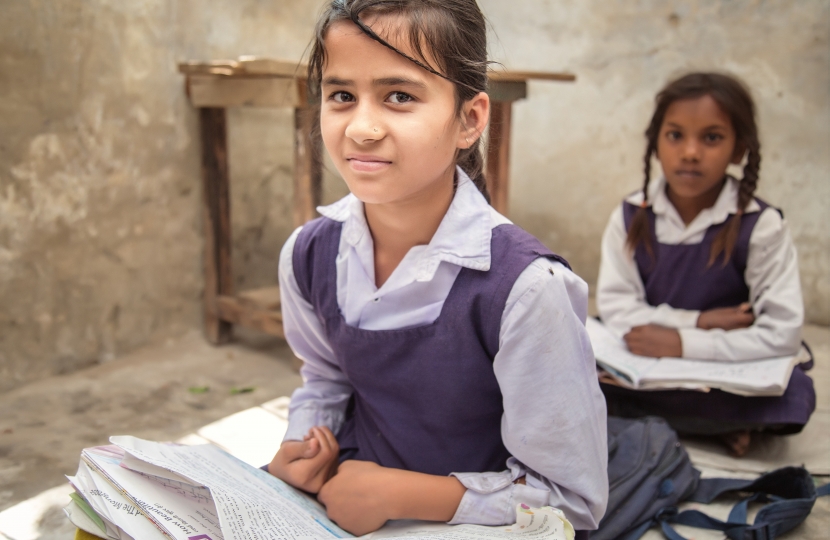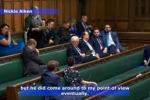
The following article was originally published by Conservative Home.
Covid-19 has unleashed a global learning crisis for children, and this affects girls most acutely. Billions of days of vital education have been lost, with children in low-income countries worst affected.
Save the Children’s analysis suggests that between 10-16 million children are estimated to be at risk of never returning to school due to the pandemic. To put that number into context, it is roughly equivalent to every child in the UK never getting back to the classroom.
The UK’s role as host of the G7 summit, and co-host of the Global Education Summit: Financing Global Partnership for Education (GPE) 2021-2025, offers a unique opportunity to ensure that Covid-19, which has taken so much from us, does not also quash a girls’ right to learn.
For girls like Mahadiya from Ethiopia, 13, the dire long-term consequences of the pandemic are already beginning to bite. She said “I wish the virus would just go away and I am able to continue my education. I don’t want to lose my hope of becoming an engineer.”
As I am the parent of two teenage children, imagining the anguish Mahadiya and her family must feel as her hopes for the future slip away, is all too close to home.
The Prime Minister is a driving force behind advancing girls’ education globally. The inequality and deprivation which excludes girls from learning is, in his words, “an absolute disgrace”. He champions this agenda because it is the right thing to do, but it is also the smart thing to do; education is an engine of global economic growth and advances gender equality. For instance, one year of secondary education increases women’s wages later in life by up to 20%, and something as simple as universal quality secondary education could avert 51 million child marriages by 2030.
Girls’ education is also a powerful tool for tackling climate change. Enhancing girls’ life skills through education helps to ensure that countries are better enabled to prepare for future climate shocks, and equips girls for jobs in the green sector. Every additional year of school for girls increases her country’s resilience to climate disasters.
Girls’ education really is, as the Prime Minister once called it, the ‘Swiss Army Knife’ of the development toolkit. Making big investments in girls’ education now, will pay dividends in the long term by helping to create a thriving and prosperous global economy now, and for generations to come.
The G7 Summit and Global Partnership for Education replenishment could not come at a more important time. It is an opportunity for the UK to use its global influence and soft power to be a world leader in tackling the learning crisis faced by the world’s poorest children.
As I argued in my piece in the One Nation Conservatives’ Global Britain and Development Papers last year, girls’ education must be at the very heart of the UK’s approach to aid, international development and foreign policy. There is no better time to make that a reality than now in the UK’s unique window of opportunity.
If the world is to build back better in the wake of the pandemic, educating girls must be at the heart of the UKs G7 presidency. Not only is quality education every girls’ right; it is one of the most important investments in human development.
From my discussions, and in response to my questions in the House, I’ve been encouraged by the government’s commitment to put education at the core of its G7 agenda, and hope ministers lead on coordinated global action.
The UK should work with G7 nations to seize these opportunities to ensure that the most marginalised children, especially girls and those in fragile and conflict-affected states, are able to return to school and catch-up on lost learning.
The UK also has a leading diplomatic role to play as the co-host of the Global Partnership for Education summit to mobilise global finance to meet the $5 billion target for the next five years.
Even within the context of a temporarily reduced aid budget, it is realistic to hope that the UK itself will contribute £600 million to GPE to help foster strong and sustainable global education systems in some of the world’s poorest countries. This pledge will go a long way in delivering the Government’s commitment to girls.
Not only will financing GPE help get 46 million more girls into school, but it has the potential to lift millions out of poverty, and protect millions more girls from child marriage.
As the host of the G7, the UK will continue to have a leading role in the global Covid recovery. Girls’ education must be a core ingredient of the response in order to build healthy, green economies, and stem the increasing tide of poverty triggered by the pandemic.
Now more than ever, it is essential that girls’ education remains both a political and a rescoring priority for the FCDO, so that the PM’s commitments to girls are met in this unique window of opportunity.






